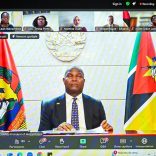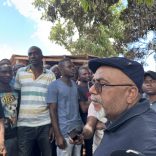Zimbabwe begins inventory of historical sites in Mozambique
Compulsive repatriation of Mozambicans: What kind of a “sister” is Tanzania? – DW

FILE - For illustration purposes only. [File photo: Lusa]
- By deporting Mozambican refugees fleeing terrorism when their neighbour is anxious to “put out the fire”, Tanzania has not shown itself to be a true “sister” to Mozambique. Is there a crisis?
The forced repatriation from Tanzania of more than 900 Mozambicans fleeing there from terrorist attacks in Cabo Delgado, northern Mozambique, began in September, according to the province’s secretary of state, Armando Ngunga.
“Those Mozambicans are being compulsorily returned to Mozambique. It is not coordinated [repatriation], it is compulsory,” Ngunga says. “Once here, they are being welcomed by us, we give them food and accommodation while we find out where they want to go.”
Read more: 830 Mozambican refugees compulsorily repatriated from Tanzania – Radio Mozambique
However, there are challenges. “Because of Covid-19, they stay there on the border in quarantine and then we take them to the [chosen] site. But we still have terrorism here,” Ngunga adds.
Where are the “historical blood ties” ?
The situation raises question as to why Mozambique’s “sister country” does not show itself, at least temporarily, more tolerant towards Mozambique, which is experiencing difficulties in the context of terrorism.
Read more: Zimbabwe’s Mnangagwa hails Tanzania’s role in liberation struggle – Watch

Is this behaviour normal? “Tanzania’s behaviour is strange, for a sister country,” peace and security expert Calton Cadeado says.
“This is not the only country behaving like this in relation to Mozambique,” Cadeado notes. “South Africa has also been compulsorily repatriating Mozambicans in the scope of the coronavirus pandemic. And this makes the relationship between Mozambique and South Africa difficult.”
Read more: More than 2,000 Mozambicans repatriated from South Africa – report
But Cadeado warns that “It is necessary to understand a little the reason for the behaviour of these two countries”. “It’s just that both countries [Tanzania and South Africa] are facing domestic crises, and need to find themselves,” he explains.
Read more: Mozambique: Rockets launched from Tanzania seriously injure 12 in border village – residents
Neither does the expert rule out the possibility of diplomatic crises between neighbours. But one of Southern African Development Community’s inviolable rules is to never let your internal quarrels “transpire” [come out into the open], something which is believed to contribute the apparatus’s consolidation and respectability.
Devaluation of refugee protection treaties?
However, there are greater, universal values, such as respect for human rights, and compulsory repatriation is a violation of international refugee protection treaties to which Tanzania is a signatory.
Juliana Dhagi, who is responsible for public relations at the UNHCR, the UN refugee agency in Pemba, confirms the basic facts of the repatriation.
“It was reported that the group is in Negomano, a border district in Mueda,” she says.
The UNHCR’s website urges that protection be granted to people from countries devastated by armed conflicts or in situations of generalised violence, which is the case in Cabo Delgado.
The UN refugee agency is also providing support on the ground, Dhagi says. “The UNHCR participated in a security mission in Negomano, and is also part of an inter-agency mission being planned within the Humanitarian Country Team (HCT)”.
The HCT is a platform where UN agencies and NGOs come together to share strategies on how to provide better emergency response.
Read more: Tanzania repatriates refugees from Cabo Delgado, Mozambique – Carta
Numbers continue to rise
Meanwhile, the Mozambican government is welcoming “its own”, doing what it can, according to the Secretary of State for Cabo Delgado, Armindo Ngunga.
“And the numbers go up. The Tanzanians said [initially] there were 352 people, but when we went to do a head count, we found out there were 836 people. After that there have been 10 more, 20 more … And now we have just over 900 people. We are managing the situation in the same way that we are managing all internally displaced people. We give them food, healthcare and other things.”
Read more: Prime Minister of Mozambique and President of Tanzania address terrorism – Notícias
DW contacted the National Refugee Support Institute (INAR) seeking more detailed information about the case, but its director, Cremildo Abreu, declined to record an interview and referred us to the public relations department of the Ministry of the Interior.













Leave a Reply
Be the First to Comment!
You must be logged in to post a comment.
You must be logged in to post a comment.